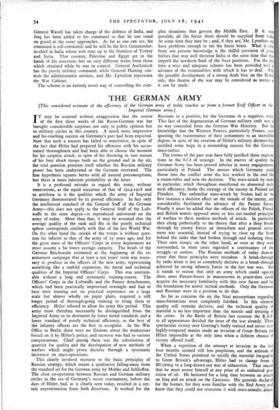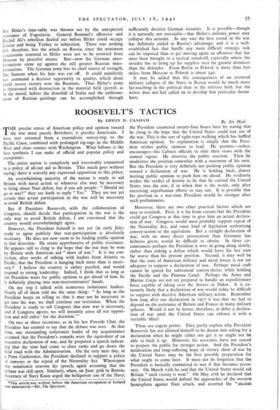THE GERMAN ARMY [This considered estimate of the efficiency of
the German army of today reaches us from a former Staff Officer in the Imperial German army.] Imay be asserted without exaggeration that the course .1 of the first three weeks of the Russo-German war has brought considerable surprises not only to public opinion but to military circles in this country. A much more impressive and far-reaching success on Germany's part had been expected.
Now that such a success has failed to materialise, in spite of the fact that Hitler had prepared his offensive with his accus- tomed thoroughness and had been able to choose the moment for his surprise attack, in spite of his throwing in vast masses of his best shock troops both on the ground and in the air, the vital question presents itself whether the Russian military power has been underrated or the German overrated. The first hypothesis squares better with all natural preconceptions, but there is more inherent probability in the latter.
It is a profound mistake to regard this army, without reservations, as the equal successor of that of 1914-1918 and to attribute to it the qualities which the army of Imperial Germany demonstrated by its proved efficiency. In fact only the intellectual standard of the General Staff of the German Army—this does not apply to the General Staff of the Luft- waffe in the same degree—is reproduced unlowered on the army of today. More than that, it may be assumed that the average quality of the rank and file in the purely technical sphere corresponds similarly with that of the last World War. On the other hand the morale of the troops is without ques- tion far inferior to that of the army of 25 years ago, and for the great mass of the Officers' Corps in every department we must assume a far lower average capacity. The heads of the German Reichswehr estimated at the beginning of the re- armament campaign that at least a ten years' term was neces- sary to produce in the officers of the new army, representing something like a tenfold expansion, the moral and technical qualities of the Imperial Officers' Corps. This was unattain- able without a long and systematic training-course. The Officers' Corps in the Luftwaffe and the Panzer detachments, which had been practically improvised overnight and had to base their training not on practical experience on a large scale but almost wholly on paper plans, required a still longer period of thorough-going training to bring them to efficiency. Hitler refused to allow his army this period. This army must therefore necessarily be distinguished from the Imperial Army to its detriment by lower moral standards and a lower standard of purely technical efficiency, as the best of the infantry officers are the first to recognise. In the War Office in Berlin there were no illusions about the weaknesses forced on it by Hitler's policy, and recourse was had to various compensations. Chief among these was the substitution of quantity for quality and the development of new methods of warfare which might prove decisive through a systematic insistence on mass-operations.
This clearly involved recourse to the basic principles of Russian strategy, which meant a qualitative falling-away from the standard set for the German army by Moltke and Schlieffen. The close co-operation between Russian and German military circles in the era of Germany's secret rearmament, before the days of Hitler, had, as is clearly seen today, resulted in a cer- tain approximation from both directions. It worked for the Russians in a positive, for the Germans in a negative, sense. This fact of the degeneration of German military craft was in no way concealed from the German War Ministry. But the knowledge that the Western Powers, particularly France, were ignoring the maintenance of their armaments to an incredible degree, in spite of the creation of Hitler's military dictatorship, justified some hope in a resounding success for the German mass-tactics.
The events of the past year have fully justified these expects. lions in the field of strategy. In the matter of quality the German Army has been proved inferior in many engagements, particularly in Poland. The masses which Germany could throw into the conflict none the less worked in the end like a steam-roller and won the decision. The mass-attack by tanks in particular, which throughout manifested no abnormal tech- nical efficiency, broke the strategy of the enemy in Poland and Flanders. The unfamiliar mass-attack by Stukas had in the first instance a decisive effect on the morale of the enemy, and considerably facilitated the advance of the Panzer forces. Finally it must be added that the officers of the Polish, French and British armies opposed more or less out-moded principles of warfare to these modern methods of attack. In particular they clung pathetically to the theory that after a deep break- through by enemy forces an immediate and general retire- ment was essential, instead of trying to close up the front behind the tanks that had broken through and isolating them. Their own troops, on the other hand, as soon as they were surrounded, in most cases regarded a continuance of the struggle as useless. The Russian methods of today demon- strate that these principles were mistaken. A break-through by tanks alone is not so completely decisive as a break-through achieved by strong infantry forces in the last war was. But it stands to reason that only an army which could operate these mass Panzer-forces in manoeuvres in peace-time could acquire the necessary familiarity with this new factor and lay the foundation for newer tactical methods. Only the Germans and Russians were in a position to do that.
So far as concerns the air the Nazi assumptions regarding mass-formations were completely falsified. In this element quality still remains decisive, and the technical quality of material is no less important than the morale and training of the crews. In the Battle of Britain last summer the R.A.F. to all appearances decided the issue of the war already. Their spectacular victory over Goering's badly trained and never very highly-tempered masses made an invasion of Great Britain for Hitler impossible at the only time when a definite chance of victory offered itself.
When a repetition of the attempt at invasion in the last four months seemed still less propitious, and the attitude of the United States promised to rectify the material inequality to Great Britain's advantage, Hitler had to change from Blitzkrieg to a long-drawn-out war of exhaustion. That meant that he must assure himself at any price of an unlimited pro- vision of oil. He hesitated for a long time between an attack on Iraq and an attack on the Caucasus. His generals declared for the former, for they were familiar with the Red Army and knew that they could not overcome it with mass-assaults alone. But Hitler's time-table was thrown out by the unexpected resistance of Yugoslavia. General Rommel's offensive and Rachid Ali's rebellion fizzled out before Hitler could occupy Greece and bring Turkey to subjection. There was nothing left, therefore, but the attack on Russia, since the minimum concessions essential to Hitler were not to be extorted from Moscow by peaceful means. But—now the German mass- formations came up against the still greater Russian mass- formations. The German army lost its chief source of strength, like Samson when his hair was cut off. It could manifestly not command a decisive superiority in quality, which alone could secure victory over the Russians. Thus Hitler's army is threatened with destruction in the material field (petrol) as in the moral, before the downfall of Stalin and the enthrone- ment of Russian quislings can be accomplished through sufficiently decisive German victories. It is possible—though it is naturally not inevitable—that Hitler's military power may collapse this autumn. At any rate the first round in the war has definitely ended to Russia's advantage, and it is a well- established fact that hardly any more difficult strategic task can be imposed than to get moving again an offensive that has once been brought to a tactical standstill, especially where the invader has to bring up his supplies over far greater distances than the defender. From Berlin to Polotsk is more than 65o miles, from Moscow to Polotsk is about 34o.
It may be added that the consequences of an eventual military collapse of the Nazis in Russia would be much more far-reaching in the political than in the military field, but the writer does not feel called on to develop that particular theme here.


























 Previous page
Previous page